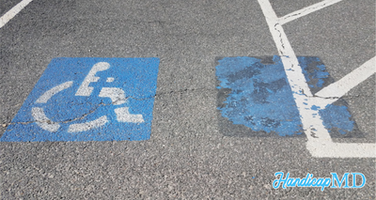
Disabled Parking Permit in Jackson: How to Obtain and Use a Handicap Parking Permit
Disability tags, often referred to as disability license plates or placards, are critical resources that help individuals with disabilities gain equitable access to essential services and facilities. In Jackson, MS, these tags are instrumental in ensuring accessibility and inclusivity for residents and visitors. This comprehensive guide explains the process of obtaining and using disability tags in Jackson, including eligibility requirements, application procedures, and best practices for their proper use.
Introduction to Disabled Parking Permits
Disability tags enable individuals with qualifying conditions to park in designated spaces, closer to entrances and facilities. These accessibility privileges are essential for those with mobility impairments, as they promote independence and improve access to public and private spaces.
In Jackson, disability tags are issued by the state Department of Revenue (DOR) and adhere to the regulations outlined in the Americans with Disabilities Act (ADA). These tags can be either temporary or permanent, depending on the individual's condition.
Types of Disabled Parking Permits in Jackson
The city offers different types of handicap permits tailored to individual needs. Each serves specific purposes depending on the nature and duration of the disability.
1. Disability Placards
- Temporary Tags:
- Issued for short-term disabilities such as recovery from surgery or injury.
- Valid for up to six months.
- Permanent Tags:
- For long-term or permanent disabilities.
- Requires renewal every five years but may not need updated medical certification.
2. Disability License Plates
- Specifically for vehicles owned or leased by individuals with permanent disabilities.
- Includes the international symbol of accessibility and is permanently attached to the vehicle.
3. Institutional Placards
- Reserved for organizations that transport individuals with disabilities.
- These tags help ensure accessible handicap parking for vehicles used by care providers.
Eligibility Criteria
To qualify for a disability tag in Jackson, individuals must meet specific criteria related to their medical conditions. The determination is based on physical or visual impairments that significantly restrict mobility or other abilities required for daily functioning.
Common Eligibility Criteria
Mobility Impairments:
- Inability to walk 200 feet without stopping to rest.
- Severe arthritis, neurological, or orthopedic conditions affecting movement.
Assistive Devices:
- Dependence on wheelchairs, braces, crutches, or other mobility aids.
Respiratory Conditions:
- Chronic obstructive pulmonary disease (COPD).
- Severe shortness of breath or oxygen dependency.
Cardiovascular Conditions:
- Class III or IV heart conditions as defined by the American Heart Association.
Visual Impairments:
- Legal blindness or significant visual impairments certified by a medical professional.
Other Disabilities:
- Conditions causing substantial difficulty with mobility or posing safety risks when walking long distances.
Several medical conditions can make individuals eligible for a disability tag. Below are some examples:
Orthopedic Disorders:
- Severe arthritis causing joint pain and immobility.
- Hip or knee replacements with long recovery periods.
Neurological Conditions:
- Multiple sclerosis (MS) affecting coordination and strength.
- Parkinson’s disease leading to tremors and instability.
Respiratory Illnesses:
- Severe asthma attacks triggered by walking long distances.
- Chronic pulmonary conditions requiring oxygen support.
Heart Conditions:
- Congestive heart failure (CHF) causing fatigue and shortness of breath.
- Angina or other conditions limiting physical activity.
Visual Disabilities:
- Retinitis pigmentosa or glaucoma resulting in impaired vision.
How to Obtain a Disabled Parking Permit in Jackson
The application process for a handicap placard in Jackson involves obtaining certification, completing forms, and submitting the necessary documentation. Follow these steps for a seamless experience:
Step 1: Obtain the Application Form
- Download the Application for Disabled Parking Privileges (Form 76-104) from the Department of Revenue’s website.
- Alternatively, pick up the form at the Jackson tax collector’s office.
Step 2: Complete the Application
- Fill out the required sections with personal information, including:
- Full name.
- Address.
- Vehicle details (if applying for license plates).
- Indicate whether the application is for a temporary or permanent tag.
Step 3: Medical Certification
- Have a licensed healthcare provider certify your condition in the designated section of the form.
- Ensure the physician includes their license number and signature for validation.
Step 4: Gather Supporting Documents
Include the following with your application:
- Proof of residency, such as a driver’s license or utility bill.
- Current vehicle registration if applying for a license plate.
Step 5: Submit the Application
- Deliver the completed application and documents to the local tax collector’s office:
- Hinds County Tax Collector Office processes disability tag applications.
- Alternatively, mail the application to the address specified on the form.
Step 6: Pay Applicable Fees
- Tags are generally free or require a nominal fee.
- License plates involve standard registration fees, with no extra charge for the disability designation.
Step 7: Await Approval
- Processing times may vary, but applications are typically reviewed within a few weeks.
- Approved applicants will receive their disability tag or plate by mail or in person, depending on the submission method.
How to Obtain a Permit Online with HandicapMD.com
HandicapMD.com offers a convenient telehealth service that simplifies the process of getting your disabled parking permit by allowing you to:
- Sign Up: Visit the HandicapMD.com website and fill out the necessary form to schedule a consultation.
- Consultation: A certified doctor will assess your medical records and determine whether you meet the eligibility criteria.
- Medical Certification: The doctor will complete the certification section of the Application for Disabled Parking Privileges (Form 76-104).
- Submit Your Application: Once your form is completed, submit it to the state's DMV either in person or by mail.
Why Getting the Permit Online is Beneficial
- Convenience: With HandicapMD.com, you don’t need to visit a doctor’s office. You can complete the entire process from home.
- Expertise: HandicapMD doctors specialize in understanding ADA guidelines and determining eligibility for disabled passes, ensuring a smoother process.
- Efficiency: The service allows for quick evaluations, helping you get your pass faster than traditional method.
Renewal and Replacement
Disability tags must be renewed periodically to remain valid. Here’s what you need to know:
Renewal Process
- Temporary Tags: Renew by submitting a new application with updated medical certification.
- Permanent Tags: Renew every five years. A new medical certification may not be required.
- License Plates: Renew alongside standard vehicle registration.
Replacement for Lost or Stolen Tags
If your disability tag or plate is lost or stolen, request a replacement by:
- Completing a replacement request form.
- Paying a nominal replacement fee.
- Providing identification and, if necessary, a police report for stolen items.
How to Appeal if Your Handicap Permit Application is Denied
Having your handicap placard application denied can be frustrating, especially if you depend on accessible parking spaces for mobility. If your application for a disability tag has been rejected, you have the right to appeal the decision. Here's a step-by-step guide to help you through the process.
1. Understand the Reason for Denial
The first step is to determine why your application was denied. Common reasons include:
- Incomplete or incorrect information on the application form.
- Missing or outdated medical certification.
- The medical condition listed does not meet the eligibility criteria.
- Lack of supporting documentation.
Check the notification or letter you received from the Department of Revenue or local tax collector’s office for specific details.
2. Review Eligibility Requirements
Ensure that your medical condition qualifies under Mississippi’s handicap placard guidelines. To qualify, your condition must significantly impair your mobility or vision, as certified by a licensed healthcare provider. Examples of qualifying conditions include:
- Inability to walk more than 200 feet without rest.
- Reliance on mobility aids such as a wheelchair or crutches.
- Severe respiratory or cardiac conditions.
- Legal blindness.
If your condition aligns with the eligibility criteria, you may proceed with an appeal.
3. Correct Any Errors or Omissions
Carefully review your application to identify any errors or missing information. Common issues include:
- Incorrect personal details.
- Incomplete sections of the application form.
- Missing or expired medical certification.
Correct any mistakes and gather all necessary supporting documents.
4. Obtain Updated Medical Certification
If your denial was due to insufficient medical evidence, schedule a follow-up appointment with your healthcare provider.
- Explain the reason for your denial and ask for additional details or documentation to support your application.
- Ensure the medical certification form is completed fully and signed by a licensed healthcare provider.
5. Submit an Appeal
To appeal your denial, follow these steps:
Step 1: Contact the Issuing Authority
- Reach out to the Department of Revenue or the tax collector’s office that processed your application.
- Request details about the appeals process and any forms or additional documents required.
Step 2: Complete the Appeal Form
- If provided, fill out the official appeal form. Include:
- A clear explanation of why you believe the denial was incorrect.
- Any new or additional documentation, including updated medical certification.
Step 3: Submit the Appeal
- Submit your appeal and supporting documents either by mail or in person to the designated office. Be sure to keep copies of all paperwork for your records.
Step 4: Follow Up
- Monitor the status of your appeal by staying in contact with the issuing office. Keep records of any communication.
6. Seek Additional Help if Necessary
If your appeal is denied again, you can take further steps:
- Contact Your Healthcare Provider: Discuss the reasons for the continued denial and explore whether additional documentation could strengthen your case.
- Legal Assistance: Consult with an attorney or advocate who specializes in disability rights if you believe your application was unjustly denied.
7. Consider Reapplying
If your appeal is denied and no further steps can be taken, you may consider reapplying:
- Wait for any stipulated timeframe before submitting a new application.
- Ensure that your new application includes updated medical documentation and addresses any issues from the previous denial.
Rules for Using Disabled Parking in Jackson, MS
To legally use accessible spaces in the city, individuals must follow these rules:
1. Display a Valid Disability Tag
- A disability tag or license plate issued by the Mississippi Department of Revenue must be properly displayed.
- Hang tags from the rearview mirror when parked and remove them while driving to avoid obstructing your view.
2. The Tag Holder Must Be Present
- The individual to whom the disability tag is issued must be in the vehicle, either as the driver or a passenger.
- Misusing a disability tag, such as allowing someone else to use it without the person with the disability, is prohibited.
3. Respect Reserved Spaces
- Accessible spaces are exclusively for vehicles displaying a valid disability tag or plate. Parking in these spaces without proper authorization is illegal.
4. Avoid Blocking Access Aisles
- Striped areas next to accessible spaces are reserved for wheelchair ramps and lifts. Parking or stopping in these areas is strictly prohibited.
5. Follow Time Limits
- Some accessible spaces may have posted time limits. Always adhere to signage to avoid penalties.
Regulations for Parking in Accessible Spaces
1. Markings and Signs
- Accessible spaces in the city are clearly marked with the international wheelchair symbol, either on signs or painted on the pavement.
2. Compliance with State Laws
- The State law mandates that only vehicles displaying a valid disability tag or plate can use accessible spaces. This law applies to public spaces and private properties, such as shopping centers.
3. Temporary and Permanent Tags
- Both temporary and permanent disability tags allow access to designated parking spaces as long as they are current and properly displayed.
Where Can You Park with a Handicap Placard in Jackson?
Disability tags issued in the city grant access to the following parking options:
1. Designated Accessible Spaces
- Reserved spaces near building entrances, ramps, and elevators are available for vehicles displaying a valid disability tag.
2. Metered Parking Spaces
- Vehicles with a disability tag or plate can park at metered spaces. In some areas, free or extended parking is allowed. Always check signage to confirm specific rules.
3. Public Parking Lots and Garages
- City-owned parking lots and garages throughout the city typically have designated accessible spaces. Check local policies regarding fees and time limits.
4. Private Parking Facilities
- Many private parking lots, such as those at shopping centers, comply with the Americans with Disabilities Act (ADA) by providing accessible spaces. Standard parking fees may apply unless explicitly waived.
5. Statewide and Nationwide Access
- City-issued disability tags are valid throughout the state and in other states under the ADA.
Is Handicap Parking Free in Jackson?
Free Parking Benefits
In many areas of the city, vehicles with a valid disability tag are eligible for free parking at metered spaces. However, specific rules may vary, so always check posted signage to confirm:
- Time limits, if any.
- Whether fees are waived for certain locations.
Public and Private Lots
- Public Lots: Many city-owned lots waive parking fees for vehicles with disability tags, though this may vary by location.
- Private Lots and Garages: Fees are typically not waived unless explicitly stated by the property owner.
Extended Parking Allowances
The State law allows vehicles with disability tags to exceed standard time limits at certain parking spaces. Check local regulations to ensure compliance.
Penalties for Misusing Accessible Parking Spaces in Jackson
The city enforces strict penalties for individuals who misuse accessible parking spaces. These penalties are designed to maintain fairness and ensure access for those who genuinely need it.
Common Violations and Their Consequences
Parking Without a Disability Tag
- Violation: Parking in a designated accessible space without a valid disability tag or license plate.
- Consequence: Fines of up to $250 for a first offense, with higher penalties for subsequent violations. The vehicle may also be towed at the owner’s expense.
Using Someone Else’s Disability Tag
- Violation: Using a tag issued to another individual when the person with the disability is not in the vehicle.
- Consequence:
- Revocation of the disability tag.
- Fines and potential criminal charges for fraud.
Blocking Access Aisles
- Violation: Parking in the striped area adjacent to an accessible space, reserved for wheelchair ramps and lifts.
- Consequence: Fines and possible towing.
Using an Expired or Invalid Tag
- Violation: Parking with a disability tag or plate that has expired or been revoked.
- Consequence: Fines, confiscation of the tag, and possible additional penalties.
Displaying a Forged or Counterfeit Tag
- Violation: Using a fake or altered disability tag or plate.
- Consequence: Severe fines and potential criminal charges, including fraud-related penalties.
How to Display Your Handicap Placard Correctly
Proper display of your disability tag ensures compliance with the law and avoids unnecessary fines or penalties.
For Disability Tags
- When Parked: Hang the tag from the rearview mirror so it is clearly visible from outside the vehicle. Ensure the expiration date and identification number are legible.
- While Driving: Remove the tag to avoid obstructing your view.
For License Plates
- Attach the disability license plate securely to the rear of the vehicle, following standard installation requirements.
- Keep the plate clean and clearly visible.
Temporary Tags
- Display temporary tags in the same manner as permanent tags, ensuring that the expiration date is prominently shown.
Carry Documentation
- Keep a copy of your tag registration or license plate documentation in the vehicle. This may be required if law enforcement requests verification.
Using Your Jackson Handicap Parking Permit in Other States
City-issued disability tags are valid throughout the United States under the Americans with Disabilities Act (ADA). However, specific parking rules and benefits may vary by state and locality.
Tips for Using Your Tag in Other States
Recognition of Tags
- City-issued disability tags are recognized nationwide, allowing you to park in designated accessible spaces in all states.
Metered Parking Rules
- Some states offer free or extended parking at metered spaces for vehicles with disability tags, while others may impose time limits or fees. Always check local signage for details.
Accessible Spaces in Private Lots
- Private parking lots, such as those at shopping centers or hotels, may have different policies regarding fees and time limits.
Temporary Tags
- Temporary tags issued in Jackson may not be valid in all states. Verify their acceptance with local authorities if traveling out of state.
International Use
- While some countries honor U.S.-issued disability tags, it’s essential to confirm local regulations before traveling abroad.
FAQs
1. Who is eligible for a disability tag in Jackson?
Individuals with qualifying medical conditions that impair mobility or vision may be eligible. These conditions include:
- Difficulty walking more than 200 feet without rest or assistance.
- Use of mobility aids like wheelchairs, walkers, or crutches.
- Severe respiratory or cardiac conditions.
- Legal blindness or other significant visual impairments.
- Temporary disabilities, such as recovery from surgery or broken bones.
2. How do I apply for a disability tag?
To apply, complete the Disabled Parking Application available from the state Department of Revenue. Your healthcare provider must certify your condition. Submit the completed form either by mail or in person at a local tax collector’s office.
3. What types of disability tags are available?
- Permanent Tags: For long-term disabilities, valid for up to five years.
- Temporary Tags: For short-term disabilities, valid for up to six months.
- Disability License Plates: For vehicle owners with permanent disabilities.
4. Are there fees for disability tags?
- Permanent and Temporary Tags: Free of charge.
- Disability License Plates: Standard vehicle registration fees apply.
5. How long are disability tags valid?
- Permanent Tags: Valid for five years, with renewal required.
- Temporary Tags: Valid for up to six months and renewable with updated medical certification.
- License Plates: Renewed annually with vehicle registration.
6. Can I use my city-issued disability tag in other states?
Yes, city-issued disability tags are recognized nationwide under the Americans with Disabilities Act (ADA). Check local regulations for specific rules on free or extended parking.
7. Is handicap parking free in Jackson?
Many metered spaces throughout the city offer free or extended parking for vehicles displaying a valid disability tag. However, rules vary by location, so check signage to confirm.
8. What should I do if my disability tag is lost or stolen?
Complete a new application and indicate the reason for replacement. If the tag was stolen, you may need a police report. Replacement fees are typically nominal or waived for tags.
Conclusion
Disability tags are vital tools for individuals with qualifying conditions, providing access to designated parking spaces, free or extended parking benefits, and compliance with the Americans with Disabilities Act (ADA).
Benefits of a Disability Tag
- Convenient access to reserved parking spaces near entrances, ramps, and elevators.
- Free or extended parking at meters and other public spaces in throughout the city.
- Legal protection against fines for parking in accessible spaces.
- Improved independence and reduced physical strain.
By understanding the eligibility requirements and using a disability tag responsibly, you can enjoy greater mobility and accessibility in Jackson and beyond.
Apply Through HandicapMD.com
Don’t wait to enhance your mobility and independence. Applying for a disability tag is easier than ever with HandicapMD.com, where you can:
- Access a simple, user-friendly application process.
- Connect with licensed healthcare providers for certification.
- Avoid the hassle of in-person visits and paperwork.
.png)






